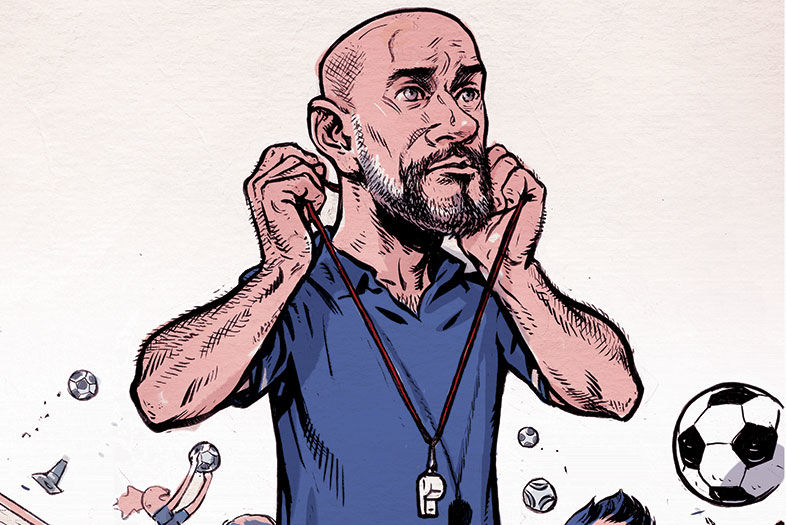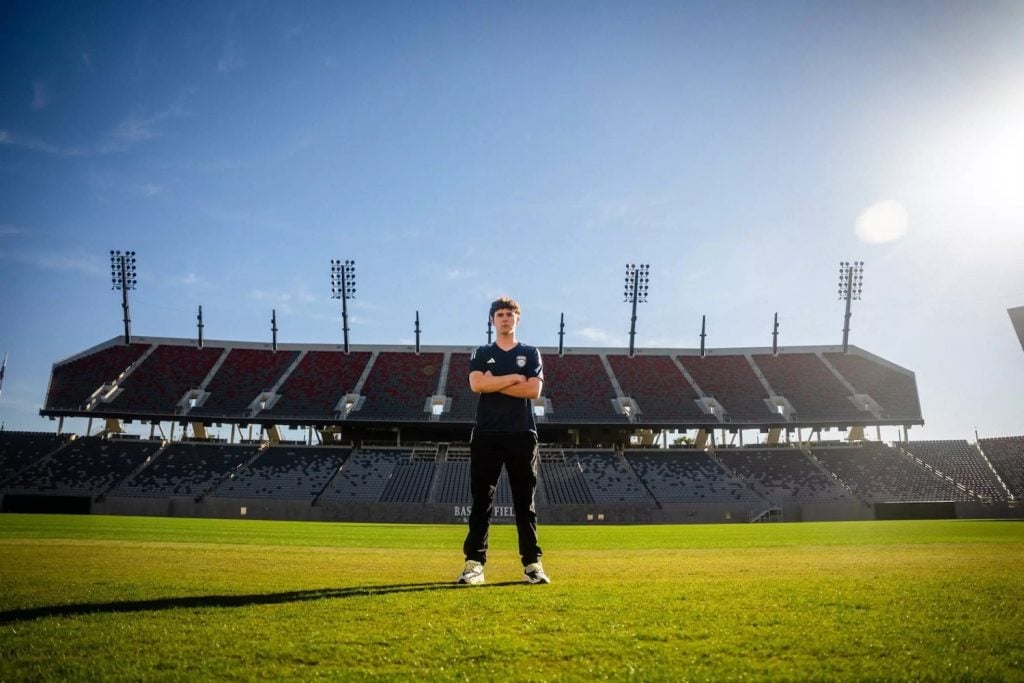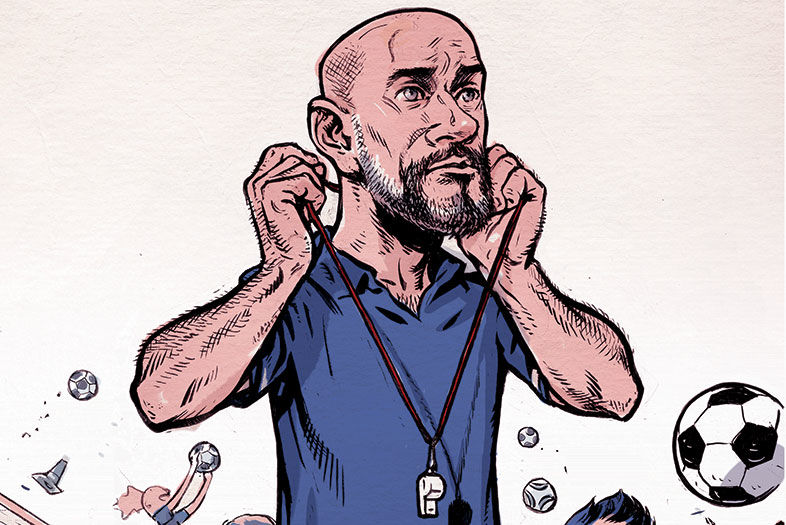When your partner looks at you with that twinkle in her eye and tells you it’s time to start trying, probably the last thing you think about is signing up for rec league soccer, but there I was.
It was September, and the twinkle had just turned six. I can still remember filling out the old analog forms—listing the names of all his elementary school classmates down the side margin, a typical nervous daddy trying to secure his baby a spot on a team with all his friends. Already, since the birth of my son, my life had changed drastically. I had no idea I was about to take on a whole new persona.
It all began when I checked the little box saying I’d volunteer to be an assistant coach.
Growing up, I was one of those kids who always had a ball in his hand.
If there was a game of anything going on within range of my Schwinn Stingray, I would find it. Like many kids, my heart was set on becoming a pro athlete. I remember telling my dad with all seriousness, “When I grow up, I want to be either a pro basketball player or a jockey.”
By my senior year of high school, I had reached a grand height of 5-foot-3—at once too short and too tall to accommodate my childhood dreams. I did find some success in soccer and lacrosse; throughout high school I trained with Kobe-like fervor to overcome my size deficit, to achieve my redefined goal of becoming a college athlete. I ended up playing varsity soccer at a respectable Division III university, making the team my freshman year. It’s not so much to brag about, but it was important to me, a lesson to myself: If I worked hard for what I wanted, I could actually make it happen. I’m still doing the same, every single day.
Gradually, during college, the jock began his transformation. Though I would grow two more inches, it was clear my talents were probably stronger in other areas. By senior year I had an internship at an alt-weekly newspaper called Creative Loafing; I’d found a new love in writing, a slightly more realistic career goal. Aside from the odd pickup game—and a brief stint during my early twenties in a coed soccer league with a team called Androgynous Dream—my sporting days were behind me.
Or so I thought.
Two decades later, on the appointed day, I arrived with my six-year-old at his first soccer practice. Across the large field was the panoply I would come to know so well over the next 12 years: the impossibly blue San Diego sky, the balls arcing through the air, the shrill twee of coaches’ whistles, the assortment of blankets and chairs and baggage belonging to the parents.
I introduced myself to the coach, reminded him I’d signed up to be an assistant if he’d have me. I’d never coached anything in my life, I told him humbly, but I was willing to help in any way I could.
The guy looked at me like I was crazy. “I never even played soccer.”
The way he said it made a little switch go off. I thought of the lacrosse coach I’d had, a football coach pressed into service, who loved to pit the players one-on-one in a circle, small guys against big. Or the coach who thought it was motivating to run wind sprints past dark. Or the coach who acted like a drill sergeant; he liked to get his nose close to yours and holler. Or the coach with the deep Southern accent who asked me, during tryouts, if I was “another one of them Jewboys.”
I think my success had a lot more to do with my other skills. A good coach is a combination of many things: therapist, minister, daddy, teacher, mentor, friend, commanding officer.
There was no way I was going to trust my kid to some well-meaning idiot.
I guess that’s the day Coach Mike was born.
And so there came the Silver Surfers, the Green Rangers, the Red Cobras, and the Black Panthers (okay, I steered the voting toward that one—a slight jab from our biracial household to our La Jolla neighbors). The U8 All Stars. The U10 All Stars. The Hoops Academy at the YMCA.
After four years, when my son was ten, I felt I’d exhausted the knowledge I had to offer. I shifted him into programs that provided professional coaches—one of which was the La Jolla Impact league, which I helped to found. No longer coaching, I became team manager. That lasted five more years, until late middle school. Eventually I was kicked upstairs, to team mom. By his senior year, I was the head team mom of varsity basketball, the first man in the history of the school to occupy the position.
Of course, that was also the year my son and all his friends quit the team. Nobody liked the coach.
One of the beauties of sport is the fact of winners and losers—the unambiguous evaluation of effort. I am proud to say that my teams won on every level, from the 10U Pizza Bowl to the District l high school championships. I’m positive that I was never the most technically proficient; Xs and Os were not my strength. Rather, I think my success had a lot more to do with my other skills. A good coach is a combination of many things: therapist, minister, daddy, teacher, mentor, friend, commanding officer.
Rules of the (Coaching) Game:
1.
Don’t sign up for a competitive sport until at least age 6. Instead, try a mixed sports program that introduces the child to several different sports at once.
2.
When you first get out there with your kid or team, make at least five supportive comments—Nice shot! Good form! Sweet stroke! Wow, you’ve been practicing!—before you give any instructions or corrections. Praise makes players more receptive to constructive criticism.
3.
When kids are young, don’t spend so much time breaking down skills and instructing. Try modeling instead. Briefly explain the techniques and then play with the kids. Do the drills. Demonstrate the techniques you wish to teach.
4.
Likewise, how you carry yourself on the field will be reflected by your team, every minute, every day. They’re watching everything you say and do. When you coach a team, you’re curating a small social unit. Create a culture. Set the tone.
5.
Coach each child differently. Bringing together a team means learning to get the most from each player.
6.
Stop yelling. Lighten up. No matter what you think, you’re making the kid hate you and the sport.
7.
Employ a commanding tone: firm, stronger and louder than normal, delivered from the gut in a military manner, but not overly stern—a fair leader who is a little bit demanding while calmly in control.
8.
When they are young, help put on shin guards and tie shoes. Yes, they’re supposed to be able to do it themselves, but the moments of intimacy you create by extending human kindness makes your players more receptive.
9.
Teach passing first.
10.
Don’t try to employ complicated set plays; instead, work on a few basic skills over and over.
11.
Every parent thinks their child is at least 50 percent better than they really are.
12.
Nobody ever gets enough playing time.
13.
Do not feel surprised when your neighbors start treating you like hired help.
14.
Achieve separation: Your kid or team is not you. You cannot do it for them.
15.
Remember that as a parent or coach, you are playing a role. Your true emotions should not be evident to the players.
16.
Do not be that coach who lives and dies on the sideline with each touch of the ball.
17.
The only person on the field who should be calling out specific names is the coach. Parents: Cheer for the team, don’t coach your kid from the sidelines.
18.
Do not give your athlete corrective notes all the way home and throughout the next several days.
19.
After your kid goes to bed, do not fight with your spouse about team politics and playing time.
20.
Don’t coach your kids past age ten. By then, if you’ve done well, they’ll have the skills you hoped to teach them. Now they’re ready for a professional.
21.
It’s only a game. The day after high school ends, you’ll never have to sit in the bleachers again.

Coach Mike: 21 Tips on Coaching Your Kid
Illustration: Lars Leetaru
















